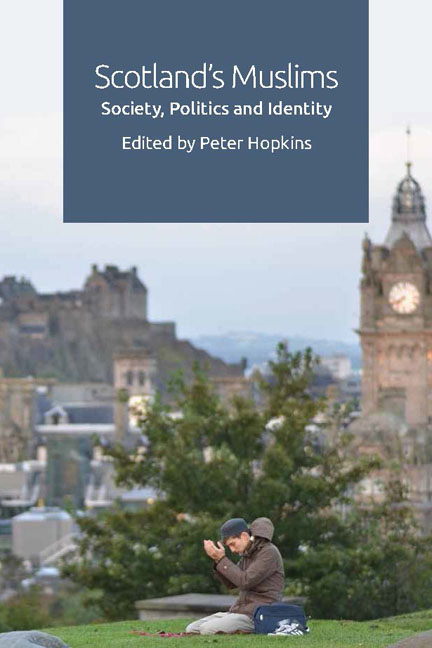Book contents
- Frontmatter
- Contents
- List of Figures and Tables
- Acknowledgements
- Notes on the Contributors
- 1 Introduction Scotland's Muslims: Early Settlement, Current Context and Research Themes
- 2 Health The Health Profile of Muslims in Scotland
- 3 Education Educational Outcomes of Muslim Pupils in Scotland and Parents' Mobilisation of Different Forms of Capital
- 4 Political Participation Young Muslims' Political Interests and Political Participation in Scotland
- 5 Gender and Migration The Role of the ‘Other’ Woman in Shaping the Subjectivities of Recent Muslim Migrant Women to Scotland
- 6 Sexuality Scottish Muslim Gay Men and the Troubling Intersection of Sexuality and Religion
- 7 Young People Muslim Youth in Scotland: Politics, Identity and Multicultural Citizenship
- 8 Generational Relations Gender and Generational Relations for Muslim Women in Scotland
- 9 Heritage Feeling Scottish and Being Muslim: Findings from the Colourful Heritage Project
- 10 Multiculturalism Multiculturalism and Scotland: ‘Bringing the Outside into the Middle’
- 11 Media Muslim Engagement with the Mainstream Media in a Scottish Context
- 12 Representation Representing Islam at the Edinburgh International Book Festival
- 13 Integration Halal Scots: Muslims' Social Integration in Scotland
- Index
13 - Integration Halal Scots: Muslims' Social Integration in Scotland
Published online by Cambridge University Press: 23 June 2018
- Frontmatter
- Contents
- List of Figures and Tables
- Acknowledgements
- Notes on the Contributors
- 1 Introduction Scotland's Muslims: Early Settlement, Current Context and Research Themes
- 2 Health The Health Profile of Muslims in Scotland
- 3 Education Educational Outcomes of Muslim Pupils in Scotland and Parents' Mobilisation of Different Forms of Capital
- 4 Political Participation Young Muslims' Political Interests and Political Participation in Scotland
- 5 Gender and Migration The Role of the ‘Other’ Woman in Shaping the Subjectivities of Recent Muslim Migrant Women to Scotland
- 6 Sexuality Scottish Muslim Gay Men and the Troubling Intersection of Sexuality and Religion
- 7 Young People Muslim Youth in Scotland: Politics, Identity and Multicultural Citizenship
- 8 Generational Relations Gender and Generational Relations for Muslim Women in Scotland
- 9 Heritage Feeling Scottish and Being Muslim: Findings from the Colourful Heritage Project
- 10 Multiculturalism Multiculturalism and Scotland: ‘Bringing the Outside into the Middle’
- 11 Media Muslim Engagement with the Mainstream Media in a Scottish Context
- 12 Representation Representing Islam at the Edinburgh International Book Festival
- 13 Integration Halal Scots: Muslims' Social Integration in Scotland
- Index
Summary
INTRODUCTION
Since the 1970s, we have seen increasing interest in the integration of Muslims as the most visible ethno-religious minority group in Britain. The term ‘integration’ as used in this chapter is concerned with the social aspect of a process in which Muslims, as well as other minority ethnic people, required and/or would like to participate in society. More elaboration of different theoretical and academic interpretations of this term is discussed later in this chapter. The social aspects of integration mainly revolve around the maintenance of Muslims’ distinctive identity and practice (Modood, 2005, 2007; Parekh, 2008; Vertovec and Wessendorf, 2010). This chapter looks at Scottish Muslims’ integration strategies (based on gender, generational and level of religiosity) and introduces the idea of ‘halal integration’ which entails fitting into society while maintaining their religious identity. This refers to the life of many Scottish Muslims, whom I refer to as ‘halal Scots’ – those who integrated into many aspects of Scottish society while maintaining their religious identity and practice. Some examples of such integration are adopting alternative ways of socialising such as meeting at cafés, running family and social events in non-alcoholic environments, and taking part in voluntary and charitable work.
Previous research reported that Muslims in northern parts of England, for instance, had developed separate rather than integrated lives (Cantle, 2001: 9), though this report was highly contested and more recent surveys have reported that there was more residential mixing in the 2000s (Simpson, 2012). Recently, for instance, David Cameron (British Government, 2011), then the British prime minister, announced at the Munich Security Conference that ‘state multiculturalism’ had encouraged ‘different cultures to live separate lives, apart from each other and apart from the mainstream’. Muslims’ distinctive identity and practice has sometimes even been perceived as a national identity threat (Goodhart, 2004; Chakraborti and Garland, 2009: 45) or has been seen as creating potential enemies within (see Ahmed, 2003). It is, however, important to note that Muslims in the Scottish context established a more mixed and integrated way of living with the majority from the outset (Hussain and Miller, 2006: 19), which was associated partly with the smaller population of Muslims in Scotland (Penrose and Howard, 2008: 95).
- Type
- Chapter
- Information
- Scotland's MuslimsSociety, Politics and Identity, pp. 259 - 280Publisher: Edinburgh University PressPrint publication year: 2017

